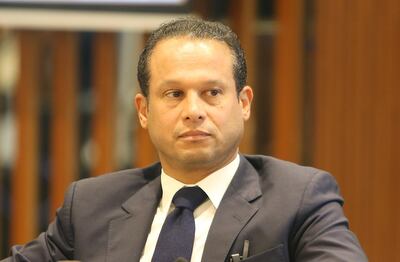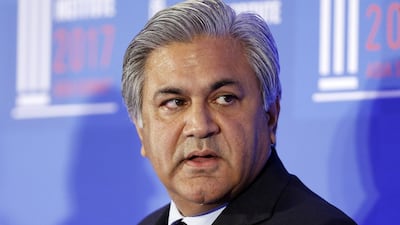In September 2017, about five months before the Middle East's largest private equity company Abraaj Group collapsed, two whistleblower emails warned investors not to invest in a $6 billion fund in the now defunct entity, The National can reveal.
The whistleblower email of September 20 with the subject line “Abraaj Fund 6 Warning” began: “Some friendly advice. Before committing to the new Fund 6, do your diligence properly and don’t believe what you are told by the partners or what you see on the slides. It is all show.”
Tarang Katira, an employee of Hamilton Lane, who helps run fund investments of the company across Europe, the Middle East and Africa out of London, forwarded the whistleblower email to Abraaj founder Arif Naqvi and Mark Bourgeois who was the head of the company’s fund raising activities in the US.
“Gents … got this email overnight,” Mr Katira wrote. “Not sure if anyone else has forwarded it to you already. Sending it so that you’re aware it’s out there and clearly targeting LPs [investors that commit capital are called limited partners in the private equity industry]. Should we chat?”
Abraaj’s “funds all have very overvalued unrealised valuations on most metrics to increase track record which are manipulated by the teams, and help the firm manipulate its P&L [profit and loss sheet] so that it appears profitable, although it is losing money ...,” the email continued.
According to the pitch presentation for Fund 6, formally known as Abraaj Private Equity Fund VI (APEF VI), which The National has reviewed, Abraaj said it had demonstrated an ability to generate "attractive returns in the key sectors" that the fund was focused on. The first sector is financial services and products, second is industrials, materials and logistics, the third is consumer goods and services, and the fourth is health care and education.
"Abraaj has achieved a 34.8 per cent gross IRR [internal rate of return] in the four sector groups where APEF VI will focus. Our [less than] <2 per cent loss ratio is among the lowest in the private equity industry globally," a slide on page five of the 17-page document reads. On the following page, the company said Fund 6 will invest in the four aforementioned sectors to create a diversified portfolio target of 25 to 30 per cent gross returns.
The fund had a minimum commitment of $25 million with a management fee of 1.5 per cent, according to the slide deck of Fund 6.
“None of the firm’s funds have paid carry [meaning carried interest or share of profits] so far and the legacy funds are being overvalued on valuation to avoid clawback [the limited partners' right to reclaim part of the carried interest],” the whistleblower email said.
Most private equity companies will only take a carry upon an exit of an investment. Some companies will calculate a carry based on a revaluation of the investment in the portfolio. The Abraaj funds in question are all fund carry, meaning once the fund is fully exited then you can collect carry in cash.
Abraaj's situation as described in the email, arguably entices it to prop up the valuation of the fund in order to collect the carry on the fund from investors. Mr Naqvi and Mustafa Abdel-Wadood as well as Sev Vettivetpillai, a managing partner out on bail, are accused by US prosecutors of inflating their fund positions to US investors to attract more capital.
"In total, Abraaj inflated the valuations of investments in private equity funds, including APEV IV, by more than half a billion dollars," according to the April 11 indictment sheet of Mr Abdel-Wadood.
Fund 6's carried interest was 20 per cent, according to the slide deck reviewed by The National.
“The governance is not what it appears, but employees are afraid to speak or partners [are so] entrenched so [they] don’t speak," the email warned. "Most important is don’t believe what you are told, keep this info to yourself and double check facts and the truth will be clear. There is no smoke without fire. Be the hero in your firm and uncover the truth by asking simple questions.”
One of the criticisms of Abraaj, according to several people who spoke on condition of anonymity, is that the company did not have independent third-party administrators for some of its funds. For Abraaj funds raised before 2013, the company did not have independent third-party administrators, according to the people familiar with the matter. .
For funds raised after 2013, all of the funds had third-party administrators including the healthcare fund, which included investors such as the World Bank’s International Finance Corporation and the Bill and Melinda Gates Foundation, which combined had about $200m in the $1bn fund.
Despite the warnings in the email, Hamilton Lane, which essentially is a gatekeeper, adviser and due-diligence provider to its pension fund investors and advises them on investments on private equity funds, committed $100m towards Fund 6, which encouraged other investors to commit as much as $900m into the fund, according to sources familiar with the matter.
Abraaj’s Fund 6 did a first closing with commitments of $3bn from the US and Asian investors with the goal of raising an additional similar amount. However, when news about the alleged misuse of funds related to the Abraaj healthcare fund broke, Abraaj released investors from their Fund 6 commitments. Thus, neither Hamilton Lane nor any other Fund 6 investor incurred any losses.

Mr Katira of Hamilton Lane in the UK declined to comment when reached by The National as he is barred from speaking to the media and directed questions to the company's public relations department.
Andrea Kramer, a managing director in Hamilton Lane's Philadelphia office, who dealt with Mr Bourgeois, did not respond to two messages left for her. Kate McGann, a media spokeswoman for Hamilton Lane, said the company would provide a statement clarifying its decision to commit to investing despite being warned not to, but it has yet to do so.
The whistleblower email also claimed Abraaj’s Pakistan, Mena and Turkey valuations "are not true", and urged investors to carry out their own due diligence. Most of Abraaj’s deals in the pipeline for the planned Fund 6 “are not real, most are dead deals and the teams know it", the whistleblower said.
Mr Naqvi subsequently sent the whistleblower email to Ashish Dave, a partner at Abraaj; Waqar Siddique, Mr Naqvi’s brother-in-law and managing partner at Abraaj; Rafique Lakhani, effectively Mr Naqvi’s bookkeeper; and Mr Abdel-Wadood, the managing partner and global head of Abraaj’s private equity business.
In his email Mr Naqvi said: “This is doing the rounds out there. Can we try and figure out who this ‘let go’ employee is?”
The National attempted to reach Mr Dave, Mr Siddique and Mr Lakhani on their mobile phones. Mr Abdel-Wadood, released on $10m bail last week, was unavailable to comment, his lawyer Paul Shechtman said.
At its peak, Abraaj had as much as $14bn in assets under management. On Friday, a court in Britain approved terms to free Mr Naqvi on £15m bail while he fights extradition to the US to face fraud charges and a possible maximum sentence of 45 years in jail.
The whistleblower was suspected of being a former Abraaj employee and wrote from a guerrillamail.com domain with a numeric address rather than a name, people familiar with the matter told The National. The second whistleblower email was sent from a Russian mail.yandex.com address, according to one person familiar with the matter. It was not reviewed by The National.
It is the understanding of The National that Bill Gates' foundation, along with the Overseas Private Investment Corporation, an arm of the US government that helps American companies invest in developing markets and has an exposure to Abraaj, underpinned the decision by the Securities and Exchange Commission to charge the Abraaj executives despite no investor in the Fund 6 losing any money.
In a November 1, 2018, regulatory filing with the SEC, Hamilton Lane said it was "aware that Abraaj are currently in provisional liquidation proceedings in the Cayman Islands, that joint provisional liquidators [JPLs] … and that mismanagement and/or other wrongdoing is alleged to have occurred at these entities prior to their entry into liquidation proceedings."
Hamilton Lane said as of the end of June 2018, less than 0.1 per cent of the company’s client assets that are more than $471bn was invested in Abraaj managed funds, according to the SEC filing. Hamilton Lane said it was working with the provisional liquidators, other investors in Abraaj-managed funds and advisors to such investors, to investigate these matters. It also said it was working with liquidators regarding one or more potential transactions relating to the management of the investments in Abraaj-managed funds.
Other investors with exposure to Abraaj include two well-known US investment banks, a Texas-based fund, a New York-based alternative asset investment company with about $40bn in assets, the Kuwait pension fund, which invested close to $800m in Abraaj, Air Arabia, which had a $336m exposure, a company in the FTSE 250 Index, investment arms of governments, and high-net-worth people.



